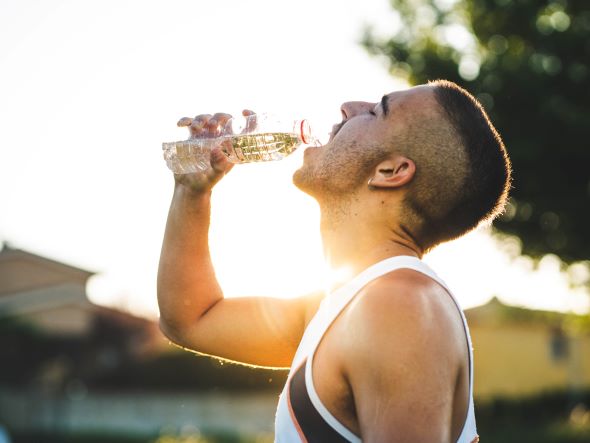- Sections :
- Crime & Public Safety
- Restaurants & Food
- Sports
- More
Categories
Hail, Hydra(tion)! A local medical expert discusses the devastating effects of not drinking enough water
THE WOODLANDS, TX – Don’t let the rain in the weather forecast fool you; we’re still in for several more weeks at least – if not months – of blisteringly hot weather. While the thunderstorms may help revive our lawns, it doesn’t matter how much water is on the outside when it comes to human hydration health.
Water, water everywhere, and not a drop to drink…
Woodlands Online sat down with Dr. Dominic Maneen, a primary care sports medicine doctor at Houston Health & Sports Medicine here in the Woodlands. Maneen studied athletic training in college at the University of Texas and did an internship at the NFL that paved the way for his passion in sports medicine. He went on to medical school in Kansas City where he concurrently received his medical degree and MBA in Healthcare Leadership. After family medicine training in Sugar Land followed by more sports medicine training in North Carolina, Maneen and his wife – both of who are primary care sports medicine doctors – put down their roots in the Woodlands.
What prompted you to get into this field?
I was diagnosed with a bone tumor in my leg at 13 years old, which was my initial introduction into the sports medicine world. I was never a great athlete, but loved being around sports and the camaraderie of being a part of a team. I was lucky enough to serve as a student athletic trainer in college and exposed to all different facets of sports medicine. I am a strong proponent of exercise being medicine, so being able to help that lifestyle is a great life calling.
What is the relationship between heat and hydration? How much water do we need to drink to stay hydrated at certain temperatures?
We all have been outside in a Texas summer, so no need to explain how miserable it can be. Dehydration is multifactorial, so there are not the best set of guidelines since the answer is on a spectrum. A general rule of thumb for athletes is 500 to 600 mL (17 to 20 fl oz) of water or a sports drink 2 to 3 hours before exercise and 200 to 300 mL (7 to 10 fl oz) of water or a sports drink 10 to 20 minutes before exercise.
What are symptoms of dehydration? What can result if we don’t stay hydrated?
Some common symptoms are extreme thirst, less frequent urination, dark-colored urine, fatigue, dizziness, and confusion. Do not rely on someone's amount of sweating or not sweating fool you. Your level of thirst is not always the best indicator of your hydration status. One of the easiest ways to know if you are meeting your fluid needs is by assessing the color of your urine. Pale yellow urine indicates you are well-hydrated. Honey-colored urine indicates you are dehydrated. Dehydration can lead to many adverse outcomes, some of the common illnesses could be urinary and kidney problems, seizures, heat illness, and sometimes even shock.
What liquids are good for hydration and what liquids aren’t, and why?
The best liquid for most people is plain old water. Cooler water is best, but even room temperature water is helpful. If you are exercising at a high intensity or more than 60 minutes, that is when I will recommend a sports drink. If you are dehydrated from an illness such as diarrhea or even COVID, Pedialyte is a great beverage to sip on throughout the day, regardless of your age. Drinks referred to as diuretics, such as alcohol, soda, coffee, and tea are drinks I would avoid before and during exercise as these can lead to dehydration.
If you spot someone suffering from dehydration, what can you do (and not do) to help?
When in doubt, please notify a healthcare professional as quickly as you can. If you are outside and worried about dehydration, the best thing to do is move that person to a cool environment outside of the heat. If the patient is coherent and awake, letting them sip on water is a good first step. Having a patient lay on their back and elevating their legs above their heart can also be helpful until professional help can arrive. Do not leave the person alone in case things worsen and you need to call 911.
Is dehydration just a ‘hot weather’ problem?
Great question and unfortunately the answer is no. In colder weather, your thirst response is diminished which leads to less water consumption in most people. In lower temperatures, our bodies also have to work harder under the weight of heavier clothes, and sweat evaporates quickly in cold, dry air. So please keep the same concepts and education above in colder weather.
If someone wants to learn more, where should they go?
There are plenty of online resources to learn about dehydration. If you are someone that is new to an environment, or more specifically going to start a new exercise regimen, sitting down with your primary care provider is a good first step. If you want something more in depth with sport/exercise specific focus, please feel free to reach out at www.HTXSportsMed.com for more information about my background, clinic, services, and to schedule an appointment today. At Houston Health & Sports Medicine, we are not surgeons, and we treat patients as best as we can in the least invasive way possible.
Comments •







